A giant squid picks a fight with a saltwater crocodile; how will things turn out? Animal battles are all about finding new ways to learn about a species” strengths and weaknesses. When we pit these two beasts against each other, who will have what it takes to swim away a winner? It’s time to find out! Follow along for an epic deep-sea battle featuring a saltwater crocodile vs. giant squid.
Key Points: Saltwater Crocodile vs. Giant Squid
- Saltwater crocodiles have top-positioned eyes, ears, and nostrils for submerging while monitoring surroundings.
- Saltwater crocodiles are large reptiles, with males reaching up to 23 feet in length and weighing up to 2,200 pounds.
- Weaknesses of saltwater crocodiles include limited land mobility, slow reactions, poor land eyesight, and weak jaw-opening muscles.
- Giant squids are deep-sea creatures with large eyes and flexible bodies.
- Giant squids are one of the largest invertebrates, with reported lengths of up to 43 feet and weights of 330 to 606 pounds.
- Giant squids have sharp-toothed suckers on their tentacles for capturing prey and escaping predators.
- Giant squids are difficult to be preyed upon due to their large size.
- Weaknesses of giant squids include vulnerability to sperm whale predation and their deep-pressure habitat.
Competitor #1: Saltwater Crocodile
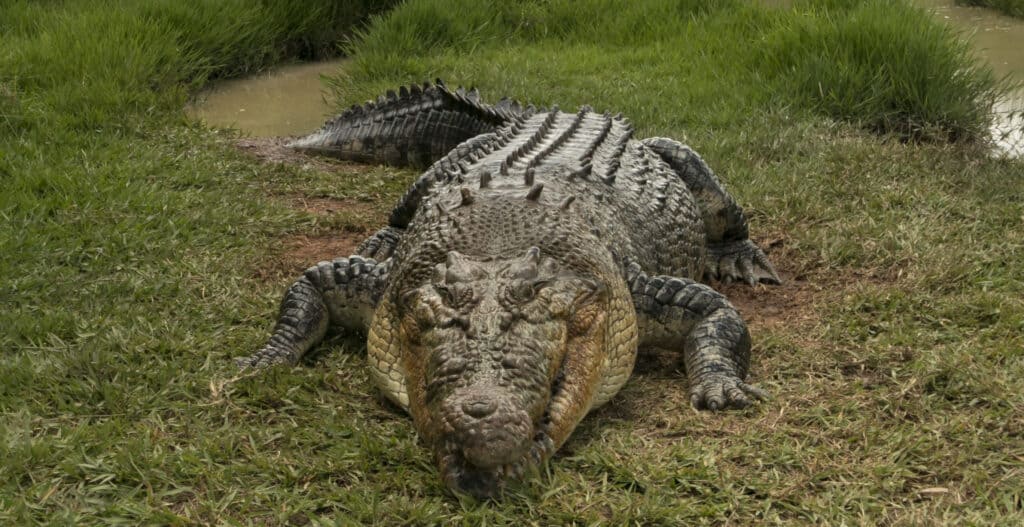
Saltwater crocodiles are made for swimming with their streamlined body and webbed feet.
©Firepac/Shutterstock.com
Saltwater crocodiles were designed to be sneaky. Their eyes, ears, and nostrils sit on the top of their head, similar to a hippo. This helps them submerge their bodies underwater while still being able to check out what’s happening above. You might not be able to see a crocodile’s ears, but they’re very powerful.
They also have bony flaps in their throat for eating and breathing underwater. Their armored scales are perfect for predator protection, and their strong jaws and sharp teeth make them a force to be reckoned with.
How do they swim so well? Saltwater crocodiles have streamlined bodies and webbed feet, which help them reach top speeds when swimming. They’re known to bask in the sun for temperature regulation and energy conservation during food scarcity.
Weaknesses: Saltwater Crocodile
What are the saltwater crocodile’s weaknesses?
It’s hard to imagine a creature this big having any weaknesses, but sometimes their size is exactly what holds them back. Saltwater crocodiles use a high walk when moving around on land. They lift their enormous bodies up and ever so slowly saunter on by. These beasts have limited land mobility and slow reactions.
These reptiles also have poor land eyesight and are not so great at hearing. Other weaknesses include vulnerability to disease and dehydration. Their armored scales also help them stay hydrated by preventing water loss, but it’s not always enough.
Finally, their jaw muscles aren’t great at opening. The saltwater crocodile might have a powerful bite when closing its mouth, but its jaw muscles are incredibly weak when opening. If something’s holding it together like the tentacles of a giant squid, it’ll be hard, if not impossible, for the saltwater crocodile to open its mouth again.
Competitor #2: Giant Squid
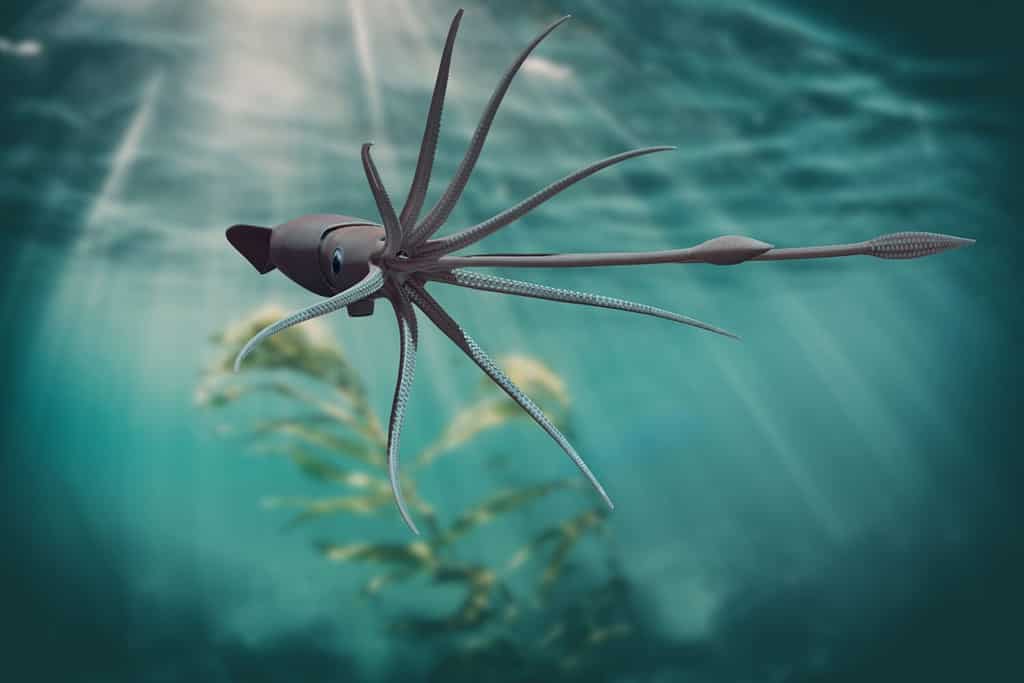
Giant squids live deep in the ocean, approximately 1,000 to 2,000 feet underwater.
©InnovationWorld/Shutterstock.com
The giant squid is a deep-sea creature. And we mean deep. These animals live between 1,000 to 2,000 feet deep underwater. Their large eyes and flexible bodies help them with deep-sea navigation and hunting.
They’re also equipped with tentacles for capturing prey and escaping predators. Among their tentacles, you’ll find sharp-toothed suckers, perfect for predation. Their size is also a big benefit when it comes to predation. Giant squids can eat practically anything they want, and since they’re so large, it’s difficult for other animals to eat them.
What are the giant squid’s weaknesses? Giant squids are vulnerable to predation by sperm whales. You can see a sperm whale devour a giant squid here. Sperm whales are one of the only creatures that are willing to take on a sizable giant squid.
Another disadvantage they have is their deep-pressure habitat. Giant squids need to live far beneath the ocean and wouldn’t be able to fight the saltwater crocodile in a shallow water habitat.
Now that you know more about our competitors, we can jump right in. Let’s kickstart this saltwater crocodile vs. giant squid animal battle with round one!
Round 1: Size
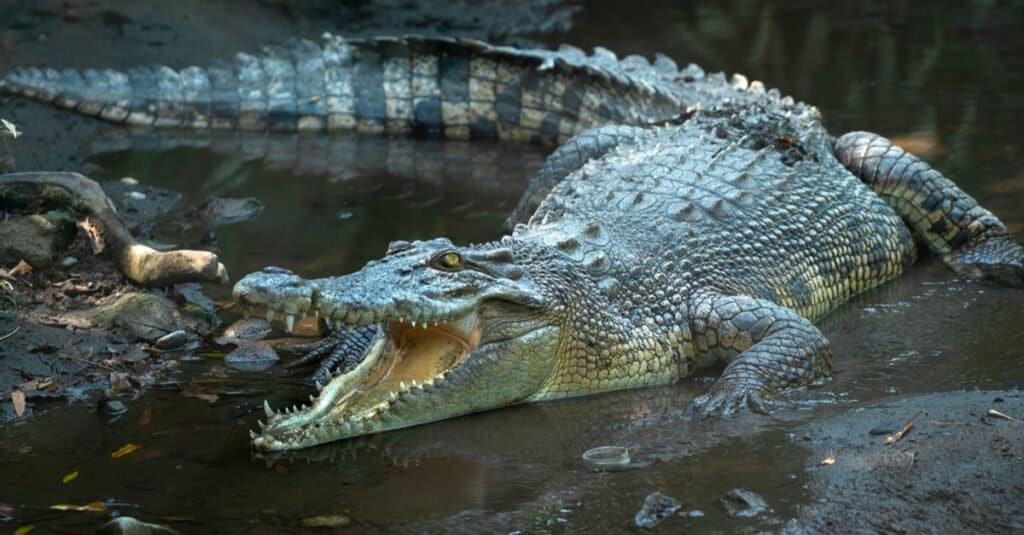
Saltwater crocodiles can weigh 2,200 pounds, but 200 to 600 pounds is a more common weight.
©Pius Rino Pungkiawan/Shutterstock.com
Round one is all about comparing our competitors’ sizes.
Saltwater crocodiles are one of the biggest reptiles in the world. Males are much larger than females, can reach monstrous lengths of 23ft, and weigh as much as 2200 pounds. An average size for an adult male saltwater crocodile would be 11ft to 19ft, typically weighing anywhere from 200 to 600 pounds.
How does this compare to the giant squid? On average, a giant squid will weigh between 330 to 606 pounds. The giant squid is one of the biggest invertebrates in existence. The longest mantle length on record is 7.4 feet. However, the mantle measures a part of their body. From the tip of the total length of a giant squid can be as much as 43 feet in length. The biggest squid on record was 59 feet long, weighing nearly a ton. As if that wasn’t big enough, there are reports of specimens reaching 66 feet. However, there isn’t any scientific documentation for the 66-footer.
Since the size of the saltwater crocodile and the giant squid can vary, it’ll be difficult to determine this animal battle on size alone. That’s why we will have to start round two and look at each competitor’s strengths and weaknesses.
Round 2: Skills and Strength
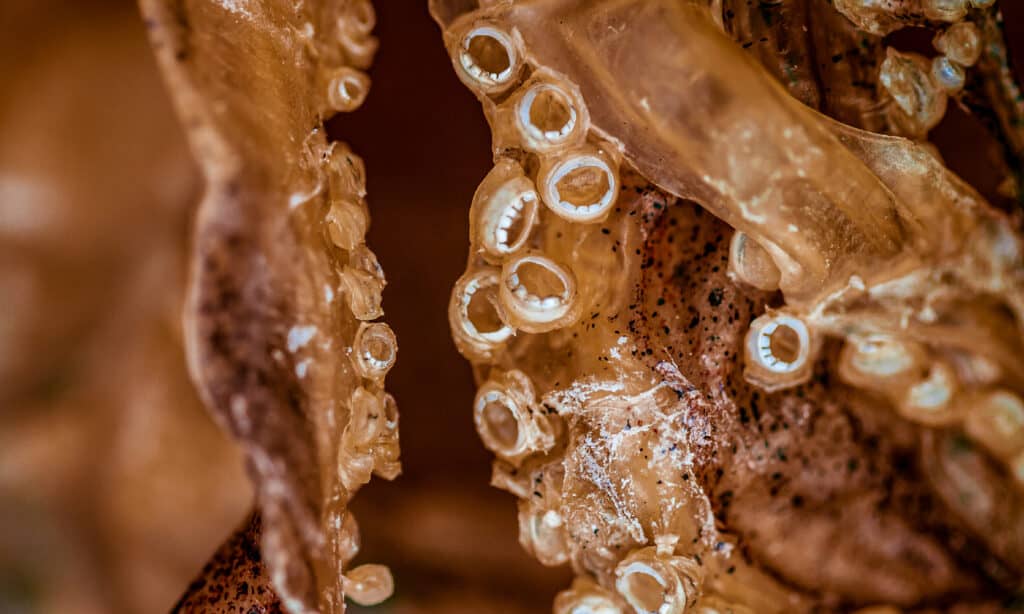
The giant squid has eight tentacles, and two of them are designed for feeding.
©remotevfx.com/Shutterstock.com
Round two for our saltwater crocodile vs. giant squid battle compares each species’ skills and strengths. Will the stealthy crocodile be able to win against a massive squid? Or will its tentacled opponent be able to take home the championship title?
Let’s start by looking at the giant squid’s skills and strengths. Since giant squids belong to the cephalopod class, they have two eyes, a beak, two long feeding tentacles, eight arms, and a funnel. Sometimes the funnel is called a siphon. The feeding tentacles can double the length of the entire squid.
Giant squids love eating deep water fishes, and their tentacles make capturing prey easy. When it’s time to eat, they whip out their long feeding tentacles tipped with hundreds of sharp-toothed suckers. Then they wrap their long, sharp tentacles around their prey, snatching them from up to 33 feet away.
Another skill the giant squid has is its ability to produce ink. The ink can deter predators, allowing the squid to run, hide, and camouflage in the environment.
This deep-sea creature also has a muscular structure. Unlike deep-sea blobfish with no bone structure, giant squids are muscular and fluid. They’re incredibly strong creatures. They’re considered as strong as their smaller cousins, the Humboldt squid.
Saltwater Crocodile Skills and Strength
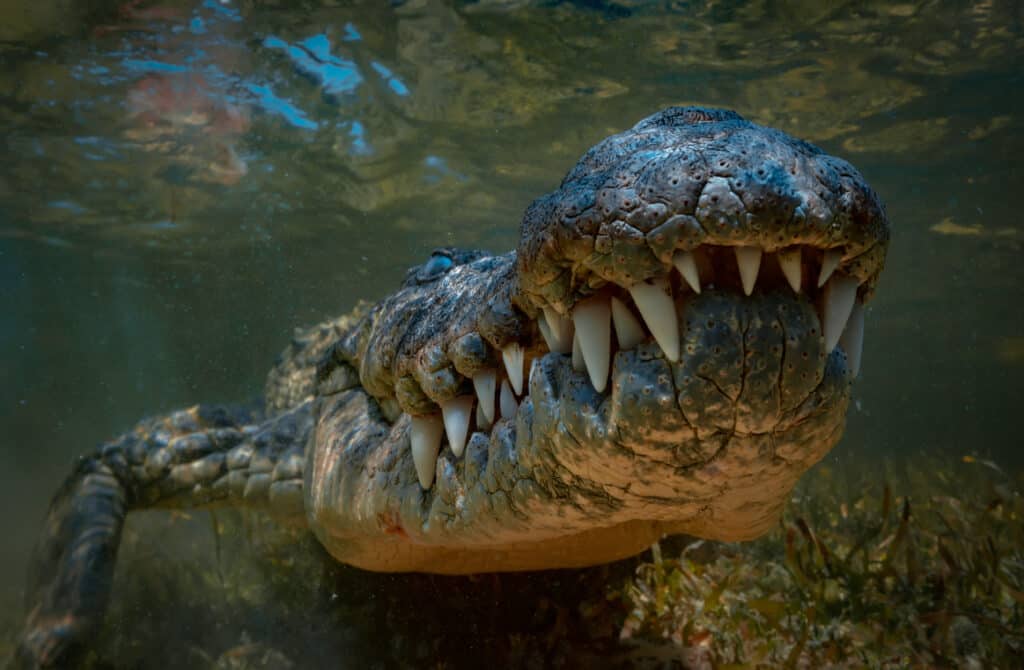
Saltwater crocodiles are ambush hunters who can remain motionless in wait for prey.
©Willyam Bradberry/Shutterstock.com
As we continue with our saltwater crocodile vs. giant squid battle, let’s take a peek at our armored competitor’s skills and strengths.
A few of the saltwater crocodile’s skills include hunting behaviors, adaptability, and communication skills. Using a variety of grunts, hisses, and bellows, these large reptiles can communicate all sorts of information with each other. They’re also highly adaptable and not picky eaters, willing to eat almost anything available.
Saltwater crocodiles are known to be able to survive with very little food for a prolonged time. They can also hunt a broad range of prey species, giving them a distinct survival advantage.
After locating prey, a saltwater crocodile will usually use the death roll maneuver to take down its opponent. This involves rapidly twisting their body around. As they twist, they’re able to drown and dismember their prey.
Another skill that this competitor has is their ability to stay still. A saltwater crocodile can remain motionless for hours, waiting for the perfect moment to strike.
As for their strength, saltwater crocodiles have the strongest bite force of any animal, around 3700 pounds per square inch. They can easily crush the bones of their prey or, in this case, the tentacles of a giant squid. And since they’re so big, these reptiles have been known to take down water buffalo and battle sharks.
It’s clear that both the giant squid and the saltwater crocodile are skilled, strong competitors. That’s why we’re going to have to carry this battle into another round of fighting to see who will become the champion.
Round 3: Speed
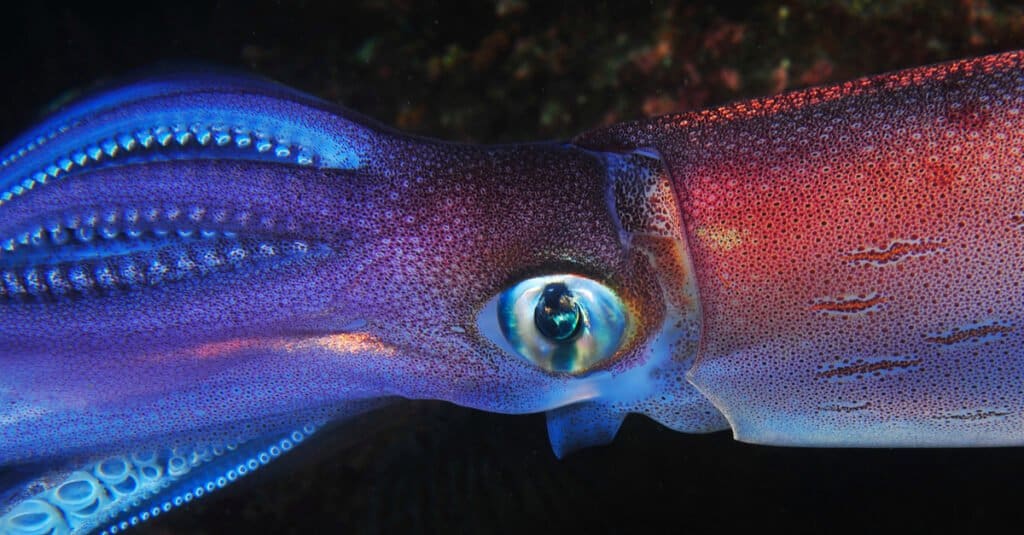
Giant squids are faster than saltwater crocodiles, with a top speed of 25 mph.
©Rui Palma/Shutterstock.com
The saltwater crocodile and the giant squid are tied in size, strength, and skills. Our final round will be the deciding factor for the championship title. And round three is all about speed.
Who do you think can swim faster? A saltwater crocodile or a giant squid? Let’s see.
Saltwater crocodiles can swim three times faster than the fastest human swimmer. These beasts can reach speeds of 15 to 18 mph. However, they can only maintain these top speeds for short bursts. For instance, when the crocodile sees its prey swimming by, it can dash after it at 18 mph, capturing it with its powerful jaws.
And while that’s scary fast, it’s not quite as fast as our squid contender. The giant squid can reach speeds of up to 25 mph. That means they’re the fastest-swimming invertebrates in the ocean. But they’re not the fastest being in the ocean. Other sea creatures can easily outswim the giant squids, such as the blue marlin, coming in at 68 mph, or the dolphin with 37 mph.
Similar to the crocodile, it’s unlikely that giant squids swim at these speeds for long periods of time. Living in a deep-water environment means withstanding a lot of pressure.
Slower movements make sense for daily activities, but speed is the squid’s friend when it’s time to hunt. After locking onto prey visually, the giant squid can shoot its tentacles out at top speeds and snatch up its prey.
It looks like round three is going to the giant squid. They’re freaky fast.
Who Wins? Saltwater Crocodile vs. Giant Squid Battle Verdict
And the winner is… the giant squid! The saltwater crocodile could inflict much damage if it bites down on the squid’s tentacles. But once the giant squid wraps its tentacles around the croc’s body, it will be game over. Sometimes even large sperm whales lose when fighting against a giant squid, evident in the long tentacle scars they leave on the sperm whale’s body.
Of course, the saltwater crocodile’s armored skin and appearance would help. They could sustain many attacks from the tentacles. However, it’ll be difficult for the crocodile to gain the advantage. They’re fast but not quite as fast as the giant squid. And a saltwater crocodile isn’t used to fighting in deep-water environments.
Going head to head, we have to give this win to the enormous and impressive giant squid. Team Squid has earned this championship title with incredible size, powerful tentacles, and impressive speed.
The photo featured at the top of this post is ©
Thank you for reading! Have some feedback for us? Contact the AZ Animals editorial team.






